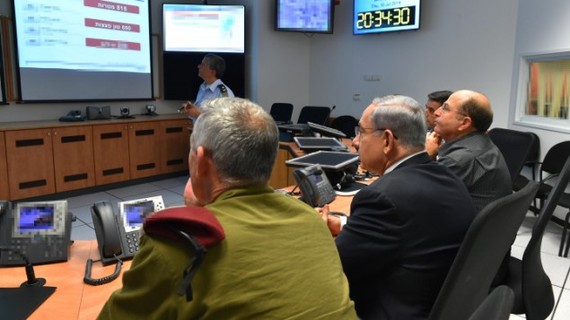
Operation Protective Edge, Israel's response to hundreds of Hamas and Islamic Jihad rockets falling onto its territory, is now 7 days old as of this writing. Nearly 900 rockets of various design have been launched from the Gaza Strip towards Israeli population centers -- including, for the first time, Tel Aviv and the port city of Haifa, where air-raid sirens have forced Israeli families to scurry for bomb shelters in the middle of the day and night. The Israeli military has responded with a heavy barrage of airstrikes on a long list of Palestinian militant targets, from the homes of individual leaders to the underground tunnels that have proven to be a central node in Hamas' military capability. The Israel Defense Force's own statistics report that 1,320 targets have been taken out since the operation began on July 8. Just to put that into perspective, that's approximately 9 airstrikes on Gaza every single hour, for six straight days.
It should thus not be a surprise that nearly every state or international organization that has a stake in the stability of Israel and the Palestinian territories are now increasing their calls for a durable, long-lasting, and effective ceasefire. As the operation goes on without any interlude in the action, Israeli strikes are beginning to claim the lives of more civilians -- over 160 Palestinians have been killed so far (the U.N. Office for Humanitarian Affairs says that 133 of the 168 people killed in Gaza after six days are civilians. That is a 79 percent, civilian casualty rate ). For Palestinian militants, this is a much-needed boon to their propaganda efforts as they attempt to strengthen their position ahead of any ceasefire negotiations, even as they continue to fire rockets indiscriminately at Israeli civilians across the Gaza border.
One thing is clear: world leaders, from Western Europe to the United Nations, do not want to witness from the sidelines more civilians being killed before Israel and Hamas both decide to again participate in the inevitable discussions about halting the fighting. Better to start negotiations now rather than later, when dozens and perhaps hundreds of additional civilians lose their lives.
U.N. Secretary-General Ban Ki-moon, through his spokesman, seemed bewildered that the Israelis and Palestinians would continue to bomb and shoot at one another even after the U.N. Security Council unanimously called for "the reinstitution of the November 2012 cease-fire" just a day earlier. President Barack Obama is as eager as the secretary-general to help facilitate another round of quiet in the area, going so far as to offer U.S. assistance to get Israel and Hamas to embrace de-escalation.
Indeed, even Israel's former Chief of Defense Intelligence, Amos Yadlin, writes that it may now be time for Israel to call the campaign in Gaza a success. "Assuming that Israel's strategic purpose was to create deterrence," Yadlin writes, "it seems to have achieved it (at a minimal cost), and the right thing to do in the coming days would be to stop the battle."
Yet assuming that Israeli Prime Minister Benjamin Netanyahu or his commanders in the IDF will pull the plug on Operation Protective Edge just because the international community demands that they do so does not understand how the Israelis have executed their wars for the past 12 years The biggest factor that will restrain further military confrontation is not strongly worded statements from the U.N., but a successful operation that accomplishes the very goals that forced the IDF into action in the first place. Whether during the 2000-2005 Second Intifada, when Israeli troops re-invaded and occupied the West Bank to curb Palestinian suicide attacks; the 2006 campaign against Lebanese Hezbollah to degrade the movement's arsenal of missiles in southern Lebanon; or the successive operations in Gaza, Israel has shown the world that it will not begin to talk about off-ramps until the objective is complete. Calls for an immediate ceasefire notwithstanding, Israel will press on with its bombing in Gaza in the hope that it can achieve a level of deterrence with Hamas that will last far longer than the 18 months that came after its November 2012 air operation.
A ceasefire requires at least two to tango, and at this stage in the conflict, there is no indication that Hamas, Islamic Jihad, or any of the other smaller Salafist extremist groups that have converted Gaza into a terrorist paradise are ready to capitulate. Reports in Israel that Hamas has already refused certain ceasefire arrangements from outside mediators leads one to believe that the group believes it can weather a few more days or weeks of Israeli bombardment -- hoping, all the while, that Palestinian civilian casualties rise to the point where the world puts pressure on the Israelis to negotiate from a weaker position.
We all know how this latest Israel-Hamas confrontation is going to end. We just do not know how long it will take to end it.

